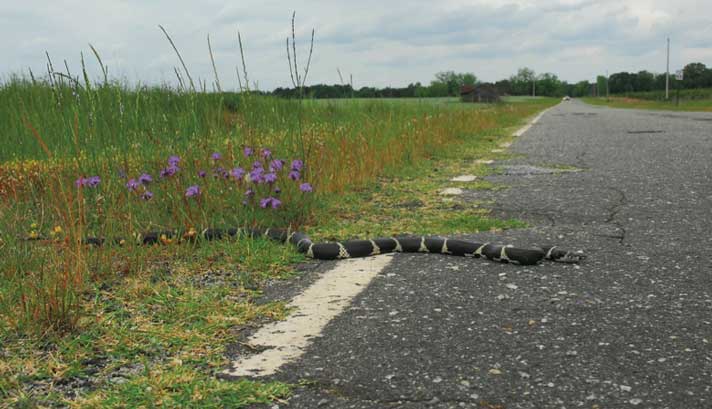Walking through a herp’s habitat to find it offers the added pleasure of communing with nature up close.
Question: Which is best for finding snakes—searching on foot or driving on roads in the country?
Kenneth Bunt, Rockport, Texas

bill love
A California kingsnake crossing a road.
Answer: The answer depends on many variables, such as the reptile species you’re seeking and its activity patterns, the terrain you’re exploring (how easy or difficult it is to find), the time of day or night you are seeking to see the reptile(s), how good your eyesight is to spot your goal on various substrates versus road surfaces, and what opportunities exist to exercise either method where you live or hope to find the herp.
Driving (a.k.a. “road cruising,” “road running” and “night driving”) certainly lets you cover more square miles, without a doubt, and that alone is enough of an advantage to make it a well-practiced pastime.
On the flip side, the photos taken on roads are usually boring, it’s expensive to do with gas prices up, and it’s also dangerous to suddenly stop in places where there’s fast-moving traffic or on curvy roads that hide you from the view of oncoming vehicles. One rule to live by when road cruising: always pull off the road surface completely when stopping for herps.
Walking through a herp’s habitat to find it offers the added pleasure of communing with nature up close, noting details about the micro-habitat and soaking up the total beauty of the creature and where it lives. If you find your goal out there, the photo ops are good and the memories of the catch are even better. I’d deem field herping as described above the more enjoyable endeavor, but road cruising is more efficient for finding numbers and variety per hours spent doing it.
Bill Love photographs herps in nature, writes and lectures. He assists his wife, Kathy, with her business, CornUtopia, and via his company, Blue Chameleon Ventures, leads nature tours to view herps in Madagascar.


